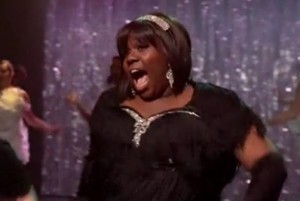Diversity + Acceptance = Tolerance, A Study of One
 I love Glee (and I have a completely inappropriate crush on Darren Criss, especially after seeing A Very Potter Musical).
I love Glee (and I have a completely inappropriate crush on Darren Criss, especially after seeing A Very Potter Musical).
Though Miss M was too young to watch the show when it started, Pre and I always let her watch the musical numbers. This week I showed her the episode where they go to Nationals, and before one of the numbers, she caught some of Unique in full makeup, but before he put on his wig. For those who don’t know, Unique is the female alter ego of male transgender character Wade. Miss M thought Wade looked “weird,” but then got completely wrapped up in Unique’s fantastic performance, and didn’t say anything more about it.
Later, Miss M asked me why “that guy was in makeup and dressed up like a girl to sing.” I said he did it because even though he was a boy, he felt like a girl inside, so that’s how he expressed who he really is.
Miss M scrunched up her face. “I don’t like that.”
“It’s different,” I said, “but that’s how it is for some people. Remember in preschool? You were good friends with Tiffany, and even though she was a girl, she felt like a boy. Remember how all the boys and girls were paired off for the graduation dance, and you danced with Tiffany?”
This is true — there was one girl in her school who absolutely self-identified as a boy. The first year Tiffany (not her real name) and Miss M were in school together, Tiffany’s parents fought it. Tiffany wore dresses, had long hair with ribbons and bows… and spent the year silently glowering.
Then one day, Tiffany came to school with super-short hair, wearing boys’ shorts and a T-shirt. She had a huge grin on her face, and was suddenly the most engaged, active, vibrant kid you’d ever want to see. Not only did Tiffany look like a little boy, whenever the kids were separated by gender for any reason, Tiffany chose to stick with the boys.
The school handled the whole thing perfectly, by not “handling it” at all. It was simply a non-issue. Tiffany was Tiffany, a great kid and a much-loved member of the school community. The teachers let her be who she was without making any kind of a fuss, and the other kids did the same — none of them batted an eye.
Graduation for this preschool involved a big to-do, with girls in dresses and boys in suits and a big choreographed boy-girl dance number. (We’re not talking Astaire/Rogers boy-girl dance number; it was more like a Ren Faire gaillard.) No way was Tiffany getting into a dress for this shindig; she wore a suit like all the other boys, and just like them she was partnered with a girl: Miss M. Miss M was thrilled; she and Tiffany were great friends, so partnering with her only made the dance more fun.
That was three years ago though — an especially long time if you’re only 7. Yet when I reminded Miss M about Tiffany, I got the “Oh yeah!” Then she smiled and shrugged, no longer concerned. “Okay.”
That was it. Once she thought about Tiffany, a friend she’d known and loved, the Unique thing didn’t bother her anymore. It became a non-issue, just as it should be, and Miss M moved on to something else. The whole conversation took no time at all, but I loved that it was a microcosm of why “diversity” and “acceptance” aren’t just buzzwords — they truly can conquer hatred. With Miss M, I saw the whole thing play out in instants: an ignorance about something (“that’s weird”) jumped to a prejudice (“I don’t like it”), which was immediately vanquished by experience as she remembered her friend (“Oh yeah! Okay.”).
And since we’re talking about the Glee finale, can we discuss the “Paradise By The Dashboard Lights” performance? I thought it was fantastic. If you haven’t seen it, check it out:



